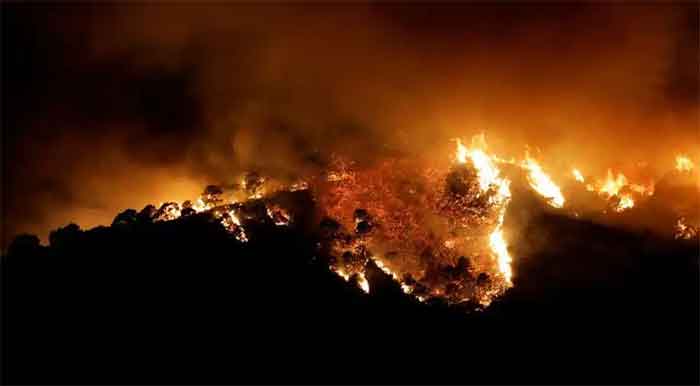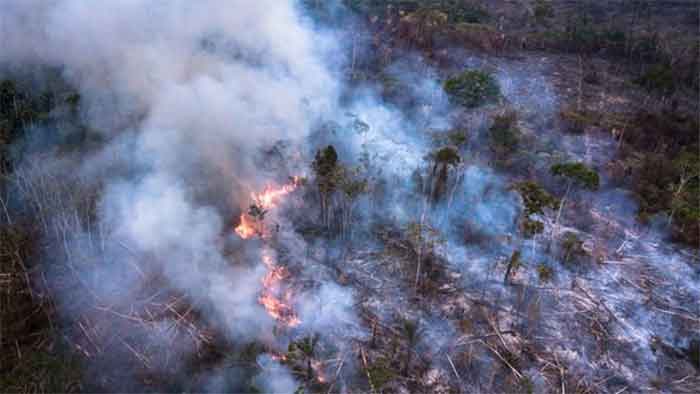
Wildfires ravaged parts of Spain, France and Portugal Friday in the blistering heat, burning forests and prompting widespread evacuations. The ongoing heatwave has already claimed hundreds of lives in the west European countries. There is a spike in heat wave-related casualties in Western Europe.
On Saturday, La Vanguardia reported that there were more than 360 deaths in Spain caused by the unbelievable heatwaves, and in Portugal, 238 deaths were recorded between July 7 and July 13.
France is currently on high alert for severe weather this weekend into next week.
Italy, Greece, Morocco and the UK are also bracing for extreme weather — including fire warnings — attributed to this week’s heatwaves.
About 14,000 people have been forced to flee France’s south-western Gironde region due to dozens of wildfires that have spread across Portugal and Spain. The fires have been attributed to soaring temperatures not seen since 1757 across Europe.
Spain
Another report citing Spain’s health ministry said:
Spain registered 237 excess deaths from July 10 through July 14.
The death toll could rise further as figures for July 15 are yet to be released.
In June, 829 estimated excess deaths were recorded in Spain due to the heat, the health ministry said.
Over 400 people were evacuated from Mijas, a picturesque village in Malaga, southern Spain as a new wildfire erupted, Reuters reported. About 20 kilometers away, beachgoers in Torremolinos spotted smoke billowing near coastal hotels. Authorities in Catalonia suspended sports and camping activities in about 275 towns and villages to prevent fire hazards.
Flames have also engulfed parts of Extremadura in western Spain, as well as the central Castille and Leon region. The wildfires threaten historical landmarks including a 16th century monastery and a national park, while over 18,500 acres of forest have been destroyed.
“What a night. We haven’t slept all night,” said Gemma Suarez, a Spanish farmer who had to evacuate Casas de Miravete, crying as she spoke to Reuters. “A social worker came to see me to go pick up my elderly uncle. We spent the night in Navalmoral but we didn’t sleep at all. I have never seen such a big fire,” she added.
France
Water-bomber aircraft and over 1,000 firefighters have been deployed in southwestern France to contain two blazes exacerbated by strong winds and tinderbox conditions, Reuters reported. Elsewhere 11,300 people have been evacuated since wildfires exploded near Dune du Pilat and Landiras, where about 18,000 acres of land has been burnt.
Around 1,200 firefighters and at least 10 water-bomber planes in France’s Gironde region battled the blaze in an effort to bring it under control between Friday and Saturday.
More than 25,000 acres (10,000 hectares) of land were on fire in the Gironde region just south of Bordeaux on Saturday, an increase from the 18,000 acres of land that were on fire on Friday.
“Everything went so fast — the fire too, was big, big, big,” said Manon Jacquart, 27, who had to evacuate a campsite where she is working this summer, on Wednesday morning.
Portugal
Portugal recorded 238 excess deaths from July 7 to 13, according to the country’s DGS health authority.
Temperatures were expected to exceed 40C in Portugal, where five districts were on a red extreme heat alert and more than 1,000 firefighters confronted 17 wildfires.
First Ever Heat Emergency In UK
An earlier report said:
The UK’s Met Office sounded the alarm on Friday morning, raising its Heat Health Alert level to red, indicating that the forecast constitutes a national emergency.
The Met Office has forecasted temperatures in England to reach 40 degrees Celsius on Monday and Tuesday, a record for the UK.
A red alert indicates that “a heatwave is so severe and/or prolonged that its effects extend outside the health and social care system,” the government agency stated. “At this level, illness and death may occur among the fit and healthy, and not just in high-risk groups.”
The Met Office advised citizens to close their curtains in rooms facing the sun, to drink plenty of fluids, and to keep an eye on younger children and older family members, as well as those with underlying health conditions. Unlike their American counterparts, most British homes do not have air conditioning equipment.
While the alert is the first of its kind issued by the UK Met Office, the warning system was only introduced in 2021. The World Health Organization has been calling for such systems to be introduced worldwide since 2016, claiming that climate change will result in more frequent and intense heatwaves this century.
Britain recorded its hottest ever temperature in 2019, when Cambridge saw 38.7 degrees Celsius in July 2019. However, waves of intense heat have been recorded periodically since record-keeping began in the early 20th Century. 1976 and 1995 are tied for the driest summers ever recorded in Great Britain, with temperatures reaching 36 degrees in 1976 and a drought persisting from June until October.
Britain also suffered a famously intense heatwave in 1808, with temperatures believed to have hit between 37 and 38.5 degrees in England that July.
Climate Crisis Pushes Extreme Weather
Scenes of firefighters tackling wildfires and roads melting in extreme heat may look dystopian, but UK forecasters say these phenomena are a result of the ongoing climate crisis.
In the summer of 2020 meteorologists at the UK Met Office used climate projections to predict the weather forecast for July 23, 2050 — and the results are startlingly similar to their forecast for Monday and Tuesday.
“We hoped we wouldn’t get to this situation,” the UK Met Office’s climate attribution scientist Nikos Christidis said in a statement. “Climate change has already influenced the likelihood of temperature extremes in the UK. The chances of seeing 40°C days in the UK could be as much as 10 times more likely in the current climate than under a natural climate unaffected by human influence.”
The chance of exceeding 40 degrees is “increasing rapidly,” Christidis said.
Lives Are At Risk
The UK Met Office has said people’s lives are at risk as temperatures could reach 40C (104F) early next week.
It issued its first ever red extreme heat warning for parts of the country including London and Manchester, calling the alert “a very serious situation.”
“If people have vulnerable relatives or neighbours, now is the time to make sure they’re putting suitable measures in place to be able to cope with the heat because if the forecast is as we think it will be in the red warning area, then people’s lives are at risk,” Met Office spokesman Grahame Madge said.
The UK Health Security Agency also increased its heat health warning from tier three to tier four — the equivalent of a “national emergency.”
Londoners Advised Not To Use The City’s Transport Network
Commuters in London have been advised not to use the city’s transport network unless for “essential journeys,” amid a sweltering heat wave across western Europe.
The UK Met Office issued an amber extreme heat warning from Sunday through Tuesday as temperatures will likely surpass the country’s 2019 record temperature of 38.7 Celsius, posing a risk to passengers.
“Due to the exceptionally hot weather that is expected next week, customers should only use London’s transport network for essential journeys,” Transport for London (TfL) chief operating officer Andy Lord said.
Temporary speed restrictions will be introduced to London’s tube and rail services “to keep everyone safe,” Lord added, urging travelers to “carry water at all times.”
Hot Temperatures Can Damage Power Lines And Signaling Equipment
Searingly hot temperatures can damage power lines and signaling equipment. TfL has said it will try to keep services running smoothly and use increased inspections to alleviate the impact of extreme heat.
Regular track temperature checks will take place to prevent tracks from bending or buckling, TfL said in a statement. The network will also check air conditioning units across the Tube network and air cooling systems on the capital’s double-decker buses.
Motorists have also been encouraged not to drive during the hottest spells of the day.
Deadly Wildfire Spreads In The Mediterranean Skyrocketing heat across western Europe has left many areas scorched and susceptible to wildfires.
On Wednesday temperatures reached 47 C in Pinhão, Portugal, the highest temperature ever recorded in the country for the month of July. And in the central town of Lousã temperatures reached 46.3 C setting an all time record high.
A pilot died after his water bombing plane crashed near Vila Nova de Foz Coa, on Friday evening.

















































